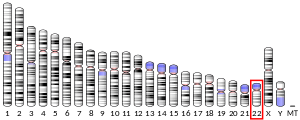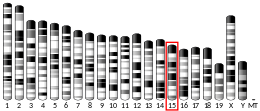ALG12
Dolichyl-P-Man:Man(7)GlcNAc(2)-PP-dolichyl-alpha-1,6-mannosyltransferase is an enzyme that in humans is encoded by the ALG12 gene.[5][6]
This gene encodes a member of the glycosyltransferase 22 family. The encoded protein catalyzes the addition of the eighth mannose residue in an alpha-1,6 linkage onto the dolichol-PP-oligosaccharide precursor (dolichol-PP-Man(7)GlcNAc(2)) required for protein glycosylation. Mutations in this gene have been associated with congenital disorder of glycosylation type Ig (CDG-Ig)characterized by abnormal N-glycosylation.[6]
References
- 1 2 3 GRCh38: Ensembl release 89: ENSG00000182858 - Ensembl, May 2017
- 1 2 3 GRCm38: Ensembl release 89: ENSMUSG00000035845 - Ensembl, May 2017
- ↑ "Human PubMed Reference:".
- ↑ "Mouse PubMed Reference:".
- ↑ Chantret I, Dupre T, Delenda C, Bucher S, Dancourt J, Barnier A, Charollais A, Heron D, Bader-Meunier B, Danos O, Seta N, Durand G, Oriol R, Codogno P, Moore SE (Jul 2002). "Congenital disorders of glycosylation type Ig is defined by a deficiency in dolichyl-P-mannose:Man7GlcNAc2-PP-dolichyl mannosyltransferase". J Biol Chem. 277 (28): 25815–22. doi:10.1074/jbc.M203285200. PMID 11983712.
- 1 2 "Entrez Gene: ALG12 asparagine-linked glycosylation 12 homolog (S. cerevisiae, alpha-1,6-mannosyltransferase)".
Further reading
- Jaeken J (2005). "Congenital disorders of glycosylation (CDG): update and new developments". J. Inherit. Metab. Dis. 27 (3): 423–6. doi:10.1023/B:BOLI.0000031221.44647.9e. PMID 15272470.
- Jaeken J, Carchon H (2004). "Congenital disorders of glycosylation: a booming chapter of pediatrics". Curr. Opin. Pediatr. 16 (4): 434–9. doi:10.1097/01.mop.0000133636.56790.4a. PMID 15273506.
- Dunham I, Shimizu N, Roe BA, et al. (1999). "The DNA sequence of human chromosome 22". Nature. 402 (6761): 489–95. doi:10.1038/990031. PMID 10591208.
- Thiel C, Schwarz M, Hasilik M, et al. (2003). "Deficiency of dolichyl-P-Man:Man7GlcNAc2-PP-dolichyl mannosyltransferase causes congenital disorder of glycosylation type Ig". Biochem. J. 367 (Pt 1): 195–201. doi:10.1042/BJ20020794. PMC 1222867. PMID 12093361.
- Grubenmann CE, Frank CG, Kjaergaard S, et al. (2003). "ALG12 mannosyltransferase defect in congenital disorder of glycosylation type lg". Hum. Mol. Genet. 11 (19): 2331–9. doi:10.1093/hmg/11.19.2331. PMID 12217961.
- Strausberg RL, Feingold EA, Grouse LH, et al. (2003). "Generation and initial analysis of more than 15,000 full-length human and mouse cDNA sequences". Proc. Natl. Acad. Sci. U.S.A. 99 (26): 16899–903. doi:10.1073/pnas.242603899. PMC 139241. PMID 12477932.
- Zdebska E, Bader-Meunier B, Schischmanoff PO, et al. (2004). "Abnormal glycosylation of red cell membrane band 3 in the congenital disorder of glycosylation Ig". Pediatr. Res. 54 (2): 224–9. doi:10.1203/01.PDR.0000072327.55955.F7. PMID 12736397.
- Collins JE, Wright CL, Edwards CA, et al. (2005). "A genome annotation-driven approach to cloning the human ORFeome". Genome Biol. 5 (10): R84. doi:10.1186/gb-2004-5-10-r84. PMC 545604. PMID 15461802.
- Gerhard DS, Wagner L, Feingold EA, et al. (2004). "The status, quality, and expansion of the NIH full-length cDNA project: the Mammalian Gene Collection (MGC)". Genome Res. 14 (10B): 2121–7. doi:10.1101/gr.2596504. PMC 528928. PMID 15489334.
- Wan D, Gong Y, Qin W, et al. (2004). "Large-scale cDNA transfection screening for genes related to cancer development and progression". Proc. Natl. Acad. Sci. U.S.A. 101 (44): 15724–9. doi:10.1073/pnas.0404089101. PMC 524842. PMID 15498874.
External links
- GeneReviews/NCBI/NIH/UW entry on Congenital Disorders of Glycosylation Overview
- Human ALG12 genome location and ALG12 gene details page in the UCSC Genome Browser.
This article is issued from
Wikipedia.
The text is licensed under Creative Commons - Attribution - Sharealike.
Additional terms may apply for the media files.




